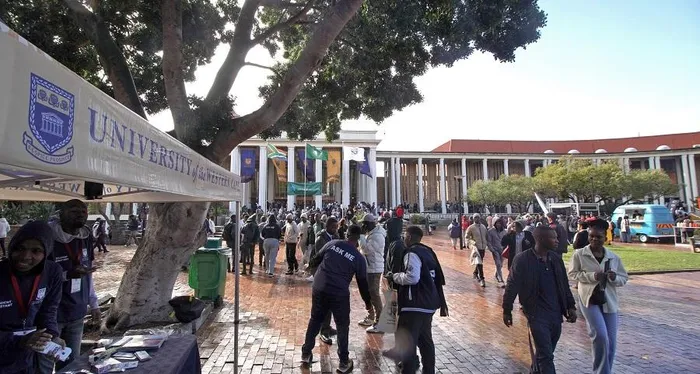A critique of the proposal to close public universities and convert them into colleges
Opinion

Dawie Roodt, an economist, should keep in mind that, universities are not narrowly designed as he would think; to produce immediate job-ready graduates, but to fulfil a broader mandate that includes critical thinking, foundational knowledge, research and public service. says the writer.
Image: Ian Landsberg / Independent Newspapers
Dawie Roodt, an economist at the Efficient Group, has advocated that certain state universities in South Africa be closed and converted into colleges, claiming that they are not creating the "right skills" in comparison to private institutions.
This concept stems from a worry about the skills mismatch in the South African employment market. However, the plan to close public institutions indicates a fundamental misunderstanding of the varied functions within the post-secondary education and training system, and it risks jeopardising public higher education's long-term developmental, democratic, and intellectual missions.
Misunderstanding the Role of Universities
Roodt should keep in mind that, Universities are not narrowly designed as he would think; to produce immediate job-ready graduates, but to fulfil a broader mandate that includes critical thinking, foundational knowledge, research and public service (CHE 2016, Badat 2010) and according to Manuel Castells, each with their own specific expectations and internal logic.
Castells argued (2001:206) that “universities perform a major role in the generation of new knowledge”. I assume that Roodt would have known that public universities are grounded in the idea of knowledge production, and innovation contributes to national development in ways that are not reducible to short-term market needs.
A university graduate and, by his own admission, of UNISA, our land university, would have known this. His reckless claim that Unisa is underperforming was without facts.
At least he should be aware that, in the last few years that UNISA, out of its 151-year history, has emerged as one of South Africa's and the African continent's premier scientific research and innovation institutions.
As a dispute to his assumption and weird disinformation about UNISA, the institution has identified ten catalytic niche areas (such as Autotmotive Studies, Energy Studies, Space studies and the Square Kilometre Array, Fourth Industrial Revolution and digitization, etc) that will activate and enhance its academic agenda while remaining focused on the institute's vision of building Africa's Intellectual capacity.
My view is that the role of public universities goes beyond “immediate” skills production; their purpose includes fostering critical thinking. The failure of Roodt’s argument was to realise that the skills gap cannot be solved by solely changing from public to private and from a public university to a private university.
The skills mismatch is structural, not institutional
The Roodt approach also ignores the fact that the gap between graduate output and labour market demand is caused by structural disjunction within the education and employment sectors, rather than institutional type. The problem, therefore, is not the existence of underperforming universities as such, but of a fragmented and unequal education system that necessitates systematic adjustment beginning with the primary school education, as he described earlier, rather than institutional extinction.
In an article published by Mail & Guardian, Prof Linda Du Plessis contends that "Roodt's reasoning oversimplifies a complex educational and sociopolitical milieu. South Africa produces high-quality graduates in a variety of sectors, and its broad statements fail to recognise important advances in research, teaching, learning, and community engagement”.
Indeed, Roodt's broad assertions fail to recognise the relevance of advances in research, education, and the learning community. He fails to recognise that these intuitions serve as the foundation for excellence.
I completely agree with Prof Linda that "Roodt's focus is almost entirely on the shortcomings of a handful of public universities, without acknowledging the many accomplishments in various disciplines."
Because these institutions serve 80% of the students enrolled in various schools, and those schools are building successful speciality sectors. But how would he know that his information appears to be based on a lack of logic and reasoning?
That is why he must understand that these universities foster critical thinking and provide students with ethical decision-making skills. He should get his facts accurate rather than making assumptions based on two or three institutions. South Africa does not need fewer universities; rather, it requires more, better, inclusive, and responsive ones. Rather than lowering our public institutions, he could have considered properly updating the same primary schooling that he claims is failing our children. “Hands off public institution Roodt”.
Private Provision is not a superior alternative
In summing up his argument about private institutions, Roodt claims that while they are agile in responding to market signals, the idea that they are categorically more effective is empirically unfounded. According to Subotzky (2003), private colleges have low academic depth, a restricted vocational orientation, and restrictive fee systems that harm the poor and working class.
Prof Linda believes that public universities are more than just educational institutions; they are engines of social mobility, redress, and transformation.
Suggesting that only 10% of the population should attend university ignores the national imperative to increase access to higher education outlined in the National Development Plan (NDP). However, Dawie would not have understood because his information is based on assumptions rather than reasoning.
Conclusion
Roodt's imagination not only misdiagnoses the problem, but it also undermines the public universities' revolutionary outlook and potential. Converting public universities to colleges or privatisation of education will not fix the country's problems.
Monethi Moshoadiba, Lecturer in the College of Human Sciences, UNISA